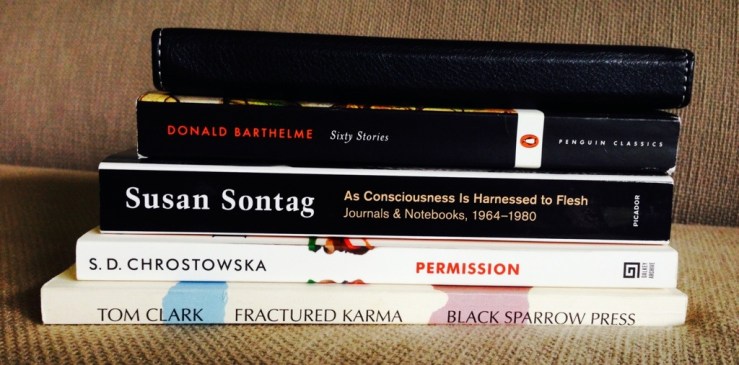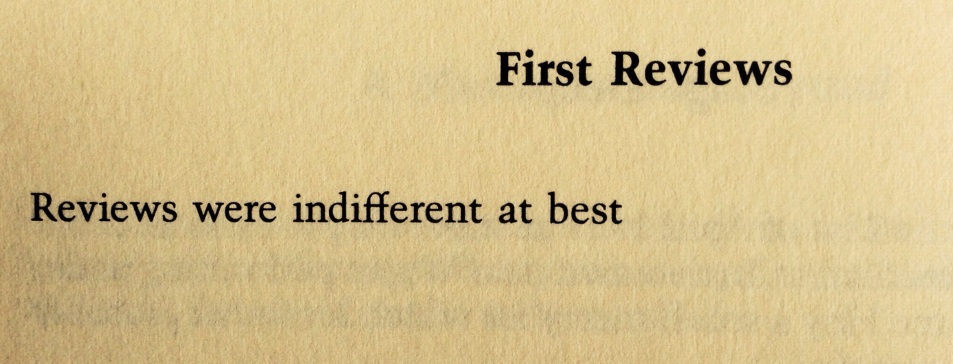
I.
Thomas Bernhard’s first novel Frost is (unless I’m mistaken) his longest, and of the several I’ve now read, the most taxing on the reader—bitter, caustic, depressive, nihilistic.
It’s also terribly funny, the story of a young doctor hell-bent on making a career for himself who heads to the remote village of Weng to spy on Strauch, “the painter,” on behalf of Strauch’s brother, who can presumably further the narrator’s medical career. The painter, long-estranged from his family, his health deteriorating, lives (if it can be called that) in a vile inn at the bottom of a gorge. The painter’s brother dispatches the narrator to report back in the minutest detail: “Watch the way my brother holds his stick, I want a precise description of it.”
II.
A word I learned reading Frost: “knacker.” A knacker is a person who renders, buries, or otherwise disposes of dead animals. The knacker of Weng is one of the main characters of Frost. He’s having an affair with the innkeeper, a symbolically overdetermined plot device (in a basically plotless book) that thematically ties death to hearth. Frost is savagely morbid, its blank white snow the perfect canvas for Bernhard’s bloody strokes. The abject violence of his next novel Gargoyles seems refined in comparison to the brutality of Frost. The painter declares that “the abattoir is the only essentially philosophical venue. The abattoir is the classroom and the lecture hall. The only wisdom is abattoir wisdom!” Frost is an abattoir.
III.
Frost is also a stage play of sorts—like the other Bernhard novels I’ve read, it takes something of its form from the conventions drama: limited sets, just a handful of characters, and dialogue that usually veers into monologue. Through the course of the novels, these monologues (usually delivered by an obsessive, sanity-challenged older man) eventually ventriloquize the ostensible narrator/auditor, a stand-in for the reader’s own consciousness. Bernhard designs, builds, destroys, and then rebuilds these consciousnesses; when the painter of Frost declares that he has mastered “perspectivelessness . . . because I am so full of different perspectives,” he offers us a condensation of Bernhard’s analysis of first-person perspective and its attendant imaginative capacity as simultaneously creative and destructive.
IV.
Indeed, as novelist Ben Marcus points out in his review of Frost:
Bernhard is an architect of consciousness more than a narrative storyteller. His project is not to reference the known world, stuffing it with fully rounded characters who commence to discover their conflicts with one another, but to erect complex states of mind—usually self-loathing, obsessive ones—and then set about destroying them. Bernhard’s characters are thorough accomplices in their own destruction, and they are bestowed with a language that is dementedly repetitive and besotted with the appurtenances of logical thinking. The devious rationality of Bernhard’s language strives for a severe authority, and it tends to make his characters seem believable, no matter how unhinged their claims. Phrases don’t get repeated so much as needled until they yield graver meanings, with incremental changes introduced as though a deranged scientist were adding and removing substances in the performance of an experiment.
V.
I can’t do better than Marcus, and Frost is too long a performance to try. I will say: Gargoyles or The Loser are probably better starting places for those interested in Bernhard’s work. This suggestion isn’t meant to slight the book at all—but it does read a bit like a first novel, occasionally weighed down by (what I perceive to be) its authors need to say it all, all of it, here and now. Of course, Frost features prose-passages that any first-time novelist would be proud (and probably terrified) to have in their debuts; I’ve featured several on the site already.
VI.
But this isn’t really a review of Frost. A proper analysis of Bernhard would take the time to work through his language. I marked so much in Frost, highlighted so many passages that I’m not really sure how to go about synthesizing it.
My initial thought was to dodge it all by making a sarcastic post, a parody of the so-called “listicle,” those non-articles that seek to boil a work down to a digestible (and forgettable) summation of quotes, often with the intention of offering the reader a modicum of self-help (under the pretense of “wisdom”). Something like “Forty Inspiring Quotes from Thomas Bernhard’s Frost” or “Timeless Wisdom from Thomas Bernhard” or some such nonsense. Anyway, the next section, VII, comprises 40 citations from Frost, mostly excellent one-liners too good not to share. I’ve enumerated them and lumped them into one big block quote; they are listed in the order they come in the text. I think that they offer a painful and funny overview of the novel.
VII.
- Suddenly I heard the story of a lineman who had been asphyxiated in a snowstorm, which ended: “He never cared about anything.”
- It’s the same disgust I felt when I was a child and had to vomit outside the open doors of the slaughterhouse.
- “Nature is bloody,” he said, “but bloodiest toward her own finest, most remarkable, and choicest gifts. She grinds them down without batting an eyelid.”
- Is it permissible for suicide to be a sort of secret pleasure to a man?
- Something was splendid, and the next thing was brutal, much more brutal than the first had been splendid.
- “You’ll get to meet a whole series of monsters here.”
- “Even dreams die. Everything turns into cold. The imagination, everything.”
- “People who make a new person are taking an extraordinary responsibility upon themselves. All unrealizable. Hopeless. It’s a great crime to create a person, when you know he’ll be unhappy, certainly if there’s any unhappiness about. The unhappiness that exists momentarily is the whole of unhappiness. To produce solitude just because you don’t want to be alone anymore yourself is a crime.”
- People don’t have favorite children, they just have a lot of them.
- I’m sure imagination is an illness. An illness that you don’t catch, merely because you’ve always had it. An illness that is responsible for everything, and particularly everything ridiculous and malignant. Do you understand the imagination? What is imagination?
- “There is a pain center, and from that pain center everything radiates out,” he said; “it’s somewhere in the center of nature. Nature is built up on many centers, but principally on that pain center.”
- “Nothing is progressive, but nothing is less progressive than philosophy. Progress is tripe. Impossible.”
- Helping and mankind, the distance between those two terms.
- Who had the idea of letting people walk around on the planet, or something called a planet, only to put them in a grave, their grave, afterward?
- By and by it comes to your attention: the world around you, nothing but corruption, colossal misrule.
- “How everything has crumbled, how everything has dissolved, how all the reference points have shifted, how all fixity has moved, how nothing exists anymore, how nothing exists, you see, how all the religions and all the irreligions and the protracted absurdities of all forms of worship have turned into nothing, nothing at all, you see, how belief and unbelief no longer exist, how science, modern science, how the stumbling blocks, the millennial courts, have all been thrown out and ushered out and blown out into the air, how all of it is now just so much air … Listen, it’s all air, all concepts are air, all points of reference are air, everything is just air …” And he said: “Frozen air, everything just so much frozen air …”
- What is pain, if not pain?
- “I used to take sleeping pills,” he said, “and slowly boosted the number of pills I took. In the end, they had absolutely no effect on me, and I could have gulped any number of them, and still not have got to sleep. I repeatedly took such high dosages, I should have died. But I only ever vomited them up.”
- Everything torments me now.
- Man is an ideal hell to his fellow men.
- He was just scraps of words and dislocated phrases.
- Things have lost their power to disgust me.
- The human race was the unfruitful thing, “the only unfruitful thing in the whole world. It serves no purpose. It can’t be made into anything. It can’t be eaten. It isn’t a raw material for some process outside itself.”
- “Men like rats, chopped up by street sweepers’ shovels. Too many negotiations with humans have done me in.”
- The ruin of mankind had been a child’s dream.
- The food had been better than for any corpse she could remember.
- “The frost eats everything up,” said the painter, “trees, humans, animals, and whatever is in the trees and the humans and the animals. The blood stalls, and at great speed. You can break apart a frozen human like a piece of stale bread.”
- There were no real humans anymore, just death masks of real humans.
- The nightmarish sweat of fear, that’s the air.
- Truth leads downhill, points downhill, truth is always an abyss.
- The abattoir is the classroom and the lecture hall. The only wisdom is abattoir wisdom!
- You wake up, and you feel molested.
- Everything is barbarous kitsch.
- “And when I saw the grisly chopped-up animals, I had to burst out laughing, I burst out into extraordinary laughter. Do you know what that means? It means horror demands laughter!”
- Various venerable old families would assemble “in a spirit of megalomania, to shoot holes in nature.
- It’s a mistake to count on people.
- Every object I see hurts me.
- ” . . . hopelessness … There is only one way to go, through the snow and ice into despair; past the adultery of reason.”
- “The world is a progressive dimming of light,.”
- The breeding of a human being (thinking most rigorously of himself) is the decision of the father (first and foremost) and of the mother (as well) to sponsor the suicide of their offspring, the child, the sudden premonition “of having created a new suicide.”



